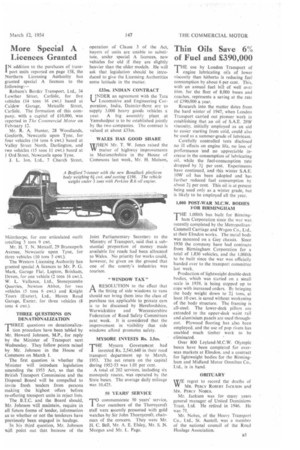Thin Oils Save 6% of Fuel and £390,000
Page 37

If you've noticed an error in this article please click here to report it so we can fix it.
THE use by London Transport of engine lubricating oils of lower viscosity than hitherto is reducing fuel consumption by about 6 per cent. This. with an annual fuel bill of well over .f6m, for the fleet of 8,000 buses and coaches, represents a saving at the rate of £390,000 a year.
Research into the matter dates from the hard winter of 1947, when London Transport carried out pioneer work in establishing that an oil of S.A.E. 20W viscosity, initially employed as an aid to easier starting from cold, could also be used as a summer-grade of lubricant.
Carefully controlled tests disclosed no ill effects on engine life, no loss of performance and no appreciable increase in the consumption of lubricating oil, while the fuel-consumption rate dropped by 31 per cent. Experiments have continued, and this winter S.A.E. 10W oil has been adopted and has further reduced fuel consumption by about 21 per cent. This oil is at present being used only as a winter grade, but is likely to be employed all the year.
1,000 POST-WAR M.C.W. BODIES FOR BIRMINGHAM
THE 1.000th bus built for Birmingham Corporation since the war was recently completed by the MetropolitanCammell Carriage and Wagon Co., Ltd., at their Elrndon works. The metal bosh, was mounted on a Guy chassis. Since 1930 the company, have had contracts from Birmingham Corporation for a total of 1,830 vehicles, and the 1,000th to be built since the war was officially handed over to the transport committee last week.
Production of lightweight double-deck bodies, which was started on a small scale in 1939, is being stepped up to cope with increased orders. By bringing the body weight down to 21 tons, at least 10 cwt. is saved without weakening of the body structure. The framing is all-steel. The lower-deck pillars are extended to the upper-deck waist rail and aluminium panels are used throughout. Plywood flooring has also been employed, and the use of pop rivets has enabled much timber work to be eliminated.
Over 800 Leyland-M.C.W. Olympic buses have been completed for overseas markets at Elmdon, and a contract for lightweight bodies for the Birmingham and Midland Motor Omnibus Co., Ltd., is in hand.
\x/E regret to record the deaths of MR. PERCY ROBERT JACKSON and MR. PERCY NOBES.
Mr. Jackson was for many years general manager of United Dominions Trust, Ltd. He retired in 1946. He was 71.
Mr. Nobes, of the Heavy Transport Co., Ltd., St. Austell, was a member of the national council of the Road Haulage Association.




































































































